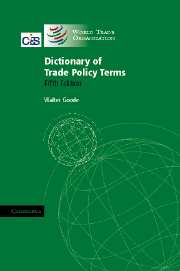Summary
Obiter dictum: a remark or observation by a court that is not essential for deciding a case. It is not binding on the lower courts nor later on the court that made it. See also stare decisis.
Observer status: participation in a meeting to observe the formal proceedings, but without the right to intervene in the debate or take part in making decisions. Observers are not usually admitted to informal sessions or negotiating meetings. They have, however, the right in most cases to address formal meetings, usually after all of the ordinary participants have had their say. They also normally receive all of the formal documents. See also dialogue partner.
OECD: Organisation for Economic Cooperation and Development. Established in 1961 as the successor to the Organisation for European Economic Cooperation (OEEC). Sometimes called a “rich-country club” because its members account for more than 70% of global output. Its objectives are (a) to achieve the highest sustainable economic growth and employment and a rising standard of living in member countries, while maintaining financial stability, and thus to contribute to the development of the world economy, (b) to contribute to sound economic expansion in member as well as in non-member countries in the process of economic development, and (c) to contribute to the expansion of world trade on a multilateral, non-discriminatory basis in accordance with international obligations.
- Type
- Chapter
- Information
- Dictionary of Trade Policy Terms , pp. 316 - 325Publisher: Cambridge University PressPrint publication year: 2007



